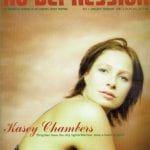Court & Spark – Like no other
Though record stores are built around them, it’s no secret that most musicians can’t stand categories. Country or blues, jazz or rock ‘n’ roll — file your record in one of these slots, that’s how the business is run. But it’s not always that easy. Especially when it comes to answering a question like, “What kind of music do you play?”
“A lot of people say country because of the instrumentation,” answers Scott Hirsch, lead guitarist for the Court & Spark. Hirsch is referring to the pedal steel, mandolin, and other stringed instruments peppering the San Francisco group’s two albums, their 2000 debut Ventura Whites and the just-released Bless You.
But to associate the Court & Spark with Merle Haggard or even Gram Parsons, and leave it at that, is misleading. “Soul music,” says M.C. Taylor, the group’s lead vocalist and rhythm guitarist, after an amused pause and a bit of shifting on the couch. Or at least, he goes on, “that’s what I tell people who know something about music.” He’s not referring to Otis or Aretha, but instead more to concepts like “feeling” and “honesty.” “In that way,” he says, “it’s sort of a soul thing.” Listen to Bless You, and you’ll get what he means.
Sure, there’s a noticeable amount of twang on quite a few of the songs. “Fireworks” moves with an easygoing melody that’d be perfect for a rural road trip; the pedal steel on the equally catchy “Pearly Gates” (courtesy of onetime Go To Blazes guitarist Tom Heyman) is right up front in the mix; and “Marlborough Sound” is a simple acoustic guitar instrumental.
If you’re looking for comparisons, Taylor’s warm, fluid voice and the group’s penchant for unhurried melodies and mellow paces bring to mind such indie acts as Souled American, Lambchop, and the Scud Mountain Boys — and, of course, country rock of the Burritos’ Gilded Palace Of Sin variety. In fact, if you check the credits, you’ll discover onetime Byrd and Flying Burrito Brother Gene Parsons guests on three of the album’s ten tracks.
The record’s multi-textured sonic landscape, however, is much wider and more complex than a single genre, however cosmic, can properly contain. “To See The Fires” kicks off the disc with some off-key strums and weird percussion before settling into its languid groove. “Rooster Mountain” has a strong, steady rhythmic core that makes it rock; “National Lights” is as much about the shimmer of the organ as it is the strummed acoustic guitar; and on the slow and mellow “Fade Out To Little Arrow”, the harmonies between Taylor and Wendy Allen combine with piano and a gently strummed guitar for a song that’s spooky and textured.
“I feel like there was a point [during the recording process] when we were listening to No Other all the time,” says Taylor, referring to Gene Clark’s 1974 solo album, a rich, multilayered, post-country-rock masterpiece. Hirsch and drummer James Kim agree. “I feel that comes through,” Taylor continues, “because I think Bless You sounds kind of big.”
“That was the intention,” agrees Hirsch. “I remember we had a talk with [producer] Scott Solter about intent, and we said, ‘We want to make something big. We want it to be lush.’ Because right then we were really into albums like No Other. Just really full, filling up all the tracks. The difference for me was being intentional about it instead of just playing and recording it. We had direction this time.”
Hirsch says the band’s first album was “a bit piecemeal,” which pretty much nails how it comes off to the listener, too. Not to say it isn’t good; writing in the SF Weekly upon its release, Chris Baty called Ventura Whites “a tour through the dark outskirts of the rural imagination” that “crackles and hums with the electricity of a band catching up to its own ideas.”
But while the songs had a similar low-key approach and a more pronounced “old-time” vibe, Ventura Whites lacked the cohesion and flow that really bind the songs on Bless You. To be fair, Ventura Whites was “our first time ever recording in a real studio,” explains Hirsch. Taylor agrees it was a learning experience of sorts: “We definitely got the idea of what we could do.”
Hirsch and Taylor had been making music for several years previously, but it was only finally beginning to gel with the Court & Spark debut disc. They had recorded a bit together in a hardcore band in Santa Barbara during the mid-1990s; it was “just loud and abrasive,” Taylor recalls. “There was no groove.”
But maybe that “abrasive” quality is why the two of them — plus Kim, a friend they hooked up with at school — gravitated toward country, which they say they found “refreshing.” After college, Hirsch and Kim moved to the Bay Area, Taylor soon followed, and together they formed the Court & Spark. By the time of Bless You, they’d brought bassist Joe Rogers (another Santa Barbara friend), steel guitarist Heyman, and vocalist Allen on board full-time.
“Thus far,” says Taylor, “since we’ve started playing together, what we’ve done has been sort of erratic or unpredictable,” Taylor says. “And I definitely think that’s still there in our attitudes. So maybe the next record will be…” His voice trails off. “Who knows?”
Whatever it becomes, Hirsch says, “It’s always going to sound like us.”




